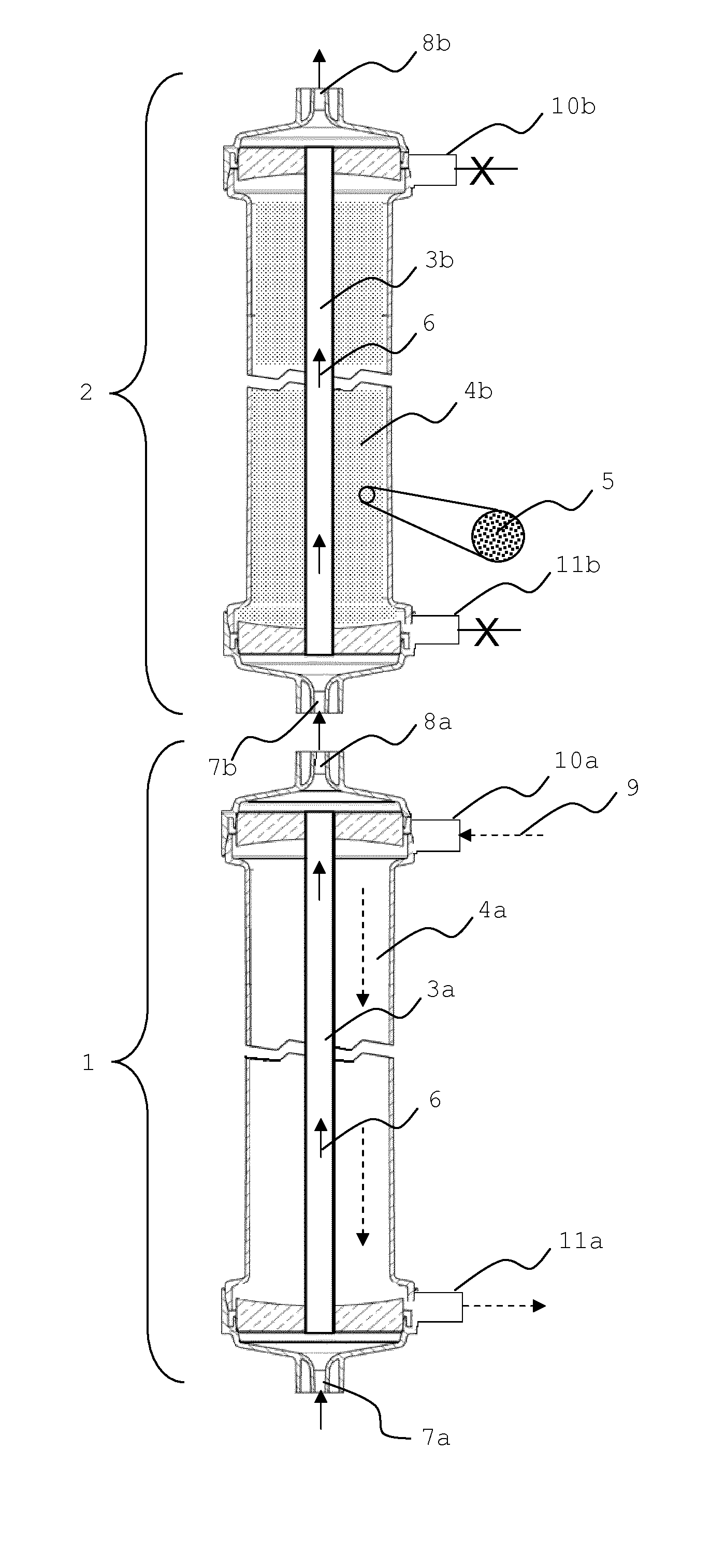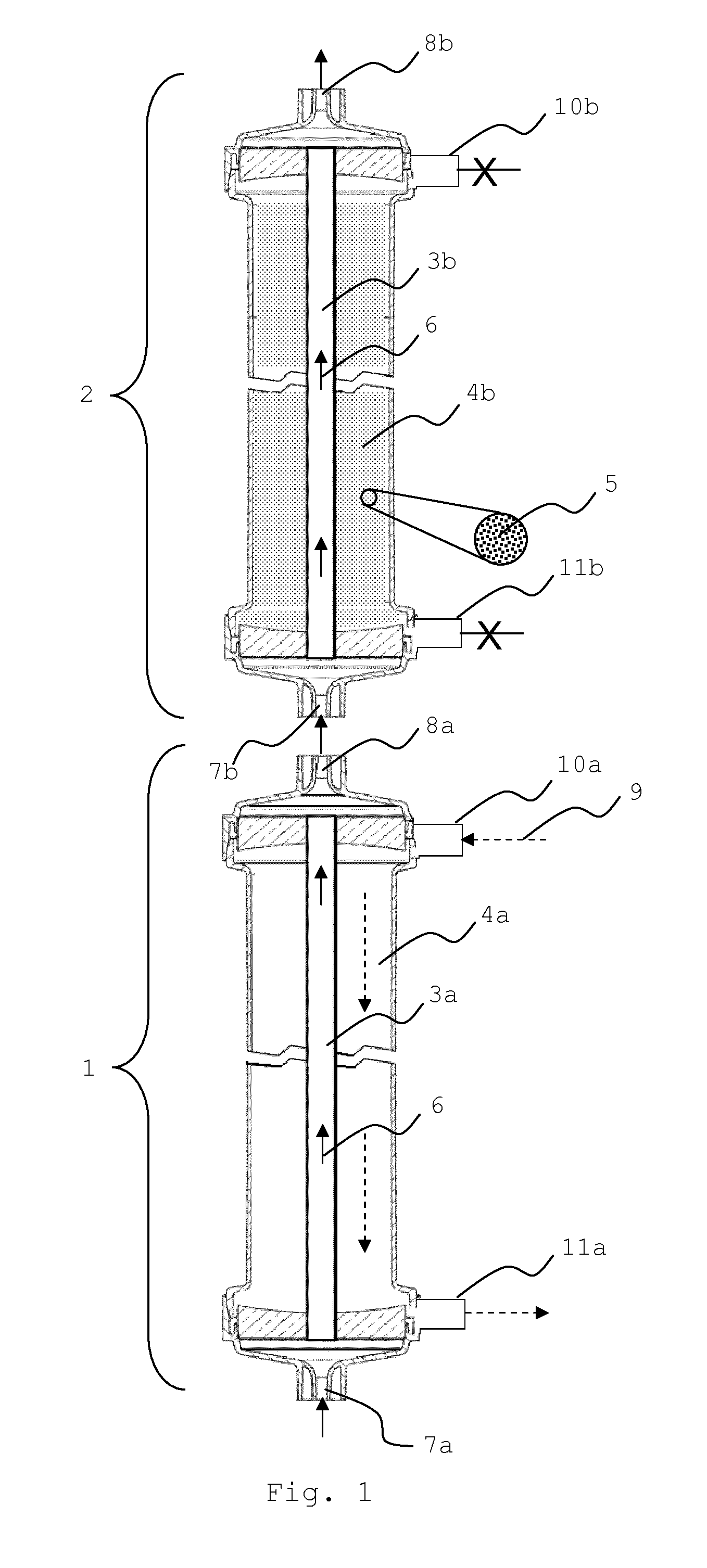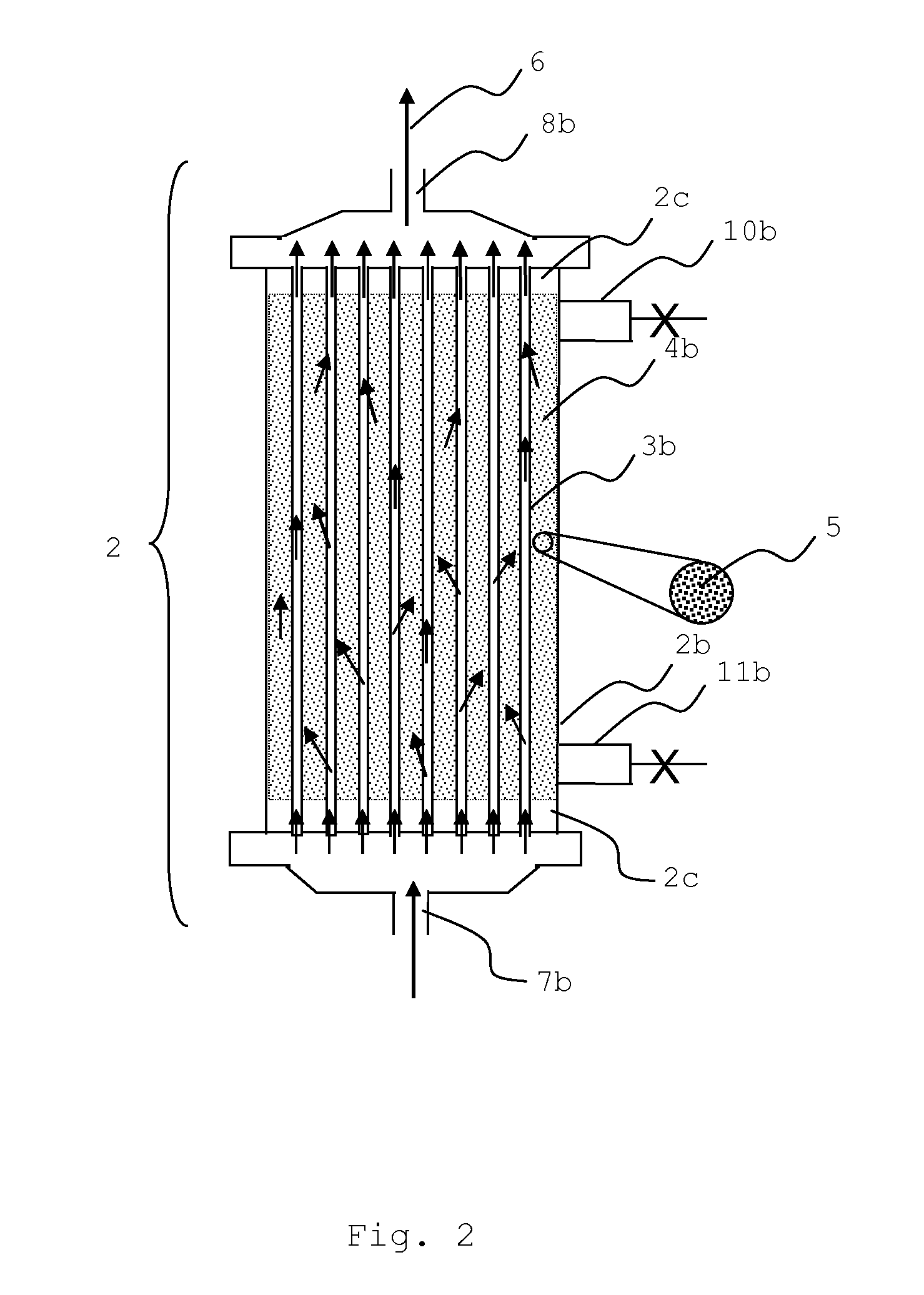Liver support system
a liver and support system technology, applied in the field of artificial and extracorporeal systems, can solve the problems of reducing the elimination efficiency of unwanted compounds, reducing the efficiency of the system, so as to improve the elimination of unwanted compounds
- Summary
- Abstract
- Description
- Claims
- Application Information
AI Technical Summary
Benefits of technology
Problems solved by technology
Method used
Image
Examples
example 1
Preparation of a Hollow Fiber Membrane for Use in Dialyzer Module (2)
[0073]Two solutions are used for the formation of the membrane, the polymer solution consisting of hydrophobic and hydrophilic polymer components (21 wt-%) dissolved in N-methyl-pyrrolidone, and the center solution being a mixture of N-methyl-pyrrolidone and water. The polymer solution contains polyethersulfone (PES 14.0 wt-%) and polyvinylpyrrolidone (PVP 7.0 wt-%) as membrane building components. The solution further contains NMP (77.0 wt-%) and water (2.0 wt-%). The center solution contains water (53.0 wt-%) and NMP (47.0 wt-%). During the membrane formation process polymer and center solution are brought in contact with a spinneret or jet and the membrane precipitates. A defined and constant temperature (58° C.) of the spinneret, the polymer solution and the center solution is used to support the process. The precipitated hollow fiber falls through a humidified shaft filled with steam (100% relative humidity, ...
example 2
Preparation of a Hollow Fiber Membrane Dialyzer (2) Comprising Hollow Fibers and Particulate Material in the Filtrate Space (Suspension Filling)
[0074]Standard hollow fibers prepared according to Example 1 were used to prepare filter modules with active particulate material on the filtrate side of the module. The housings used possess connectors at the blood side and the filtrate side according to ISO 8637:2004. The fibers had an inner diameter of 215 μm and a wall thickness of 50 μm. The fibers were slightly crimped with a depth of 0.6 mm or 0.8 as shown in Table I. The total membrane surface area was either 1.9 m2 or 1.7 m2 as shown in Table I. The housings had a diameter of 48 mm and a total length (effective fiber length) of 270 mm. The potting material consisted of polyurethane.
TABLE IPrototypes2345679Membrane1.91.91.91.91.71.71.9areaA [m2]Ujotit PA-46.9239.1743.6935.6360.4242.4734.3930 [g]Cholestyr-5.2113.066.7217.8220.1421.2417.20amine [g]Active0016.8117.82021.2417.20carbon [g...
example 3
Removal of Liver Toxins
[0077]The liver support system according to the invention (see FIG. 1) was tested in a re-circulating test setup (FIG. 6) comprising the Prototypes of Example 2 as dialyzer (2) and an oXiris® filter (Gambro) as dialyzer (1) on a PrismafleX® machine (Gambro). The test pool of 3000 ml contained 75 or 375 mg / l conjugated bilirubin (Sigma), 25 or 125 mg / l unconjugated bilirubin MW 842.9 (Calbiochem), 100 or 1000 mg / l chenodeoxycholic acid (CDCA) (Sigma), 1000 mg / l creatinine anhydrous (Sigma-Aldrich) and 20 mg / l ammonium chloride >99.5% (Roth) in Octaplas® LG human plasma (blood group 0, from Octapharma) which is kept at about 37° C. The respective higher concentrations were used for Prototypes 6, 7 and 9 (see FIGS. 7-10). The pool further contained 5 ml heparin (Heparin-Natrium-25000-ratiopharm). 60 ml 0.1M HCl were added to reach a neutral pH. The pool was protected from light at all times. The dialyzers were connected to the machine as prescribed and run in CVV...
PUM
| Property | Measurement | Unit |
|---|---|---|
| flow rates | aaaaa | aaaaa |
| pore radius | aaaaa | aaaaa |
| pore radius | aaaaa | aaaaa |
Abstract
Description
Claims
Application Information
 Login to View More
Login to View More - R&D
- Intellectual Property
- Life Sciences
- Materials
- Tech Scout
- Unparalleled Data Quality
- Higher Quality Content
- 60% Fewer Hallucinations
Browse by: Latest US Patents, China's latest patents, Technical Efficacy Thesaurus, Application Domain, Technology Topic, Popular Technical Reports.
© 2025 PatSnap. All rights reserved.Legal|Privacy policy|Modern Slavery Act Transparency Statement|Sitemap|About US| Contact US: help@patsnap.com



